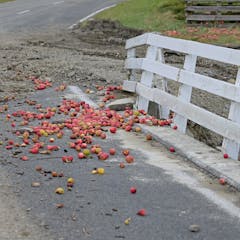
Articles on Viticulture
Displaying all articles

Winemakers need to understand the full extent of climate change impacts on the industry, including how changes in temperature and humidity may affect the microbes that ferment grapes.

While the notion of terroir has long been the foundation of European wine, research in the 1930s in the US began to reveal the link between climate and wine.

Horticulture underpins the local economy in areas devastated by Cyclone Gabrielle. Climate change may mean some parts of the region will become less suitable for crop production during this century.

The overall goal in natural wine production is to have as little human intervention as possible in the journey from the vineyard to the wine.

From my years researching wine chemistry and wine oxidation, I know making every attempt to minimise contact between wine and oxygen is vital. Sealing the bottle is essential.

Growing grapes and making wine come with a lot of implications about a culture’s capabilities. Apparently, Sicily of 6,000 years ago was more sophisticated than archaeologists had given it credit for.

Wine lovers can rest assured. Wine will adapt to climate change.

Using historical records, researchers determine that wine harvests are happening earlier in France and that the changing climate could make it harder to grow in today’s wine regions.

The wine industry is sensitive to climate change, but grape growers also have the funding and knowledge to put themselves at the forefront of climate adaptation. Other farmers should watch with interest.
